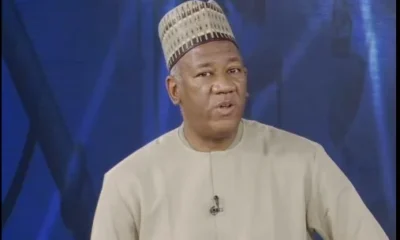There are strong indications that President Bola Tinubu may scrap the Ministry of Humanitarian Affairs and Poverty Alleviation as part of a major cabinet rejig.
The exercise would also see some portfolios split and others merged into a single entity, while some ministers would be relieved of their duties, a Presidency source said.
President Tinubu has been facing increasing pressure from within and outside his party, the All Progressives Congress, to sack underperforming ministers in his cabinet.
Despite warning against underperformance about 10 months ago, the cabinet has remained largely intact, except for the suspension of the Minister of Humanitarian Affairs and Poverty Alleviation, Dr. Betta Edu.
Last November, after a three-day retreat for cabinet members and presidential aides, Tinubu announced that a Central Delivery Coordination Unit headed by the Special Adviser to the President on Policy Coordination, Mrs. Hadiza Bala-Usman, would measure the performance of ministers and other top government officials.
Their performance would determine who would leave or remain, Tinubu stated. “If you are performing, nothing to fear. If you miss the objective, we’ll review it. If no performance, you leave us. No one is an island and the buck stops on my desk,” the President told participants.
However, sources in the Presidency under anonymity said the reshuffle would transcend portfolio swaps.
Instead, some portfolios and ministries would be split, merged or scrapped.
The officials, who spoke on condition of anonymity because they were not authorised to speak on the matter, said the Ministry of Humanitarian Affairs, whose helmswoman, Dr. Betta Edu, was suspended in January, would be scrapped entirely.
“I think it is overdue now. In fact, he (Tinubu) was supposed to announce the changes last week, but he was out of the country; that was why. But he wants to do it while he is around.
“It is not just about reshuffling his cabinet. He is also going to restructure some of the ministries for effectiveness and output because the current structure in some of them is not effective.
“Just to let you know, he may be scrapping the Ministry of Humanitarian Affairs because he does not think there is a need for it. There are several agencies that are performing those functions already and they can do it without a ministry. So, he sees no need for it,” the source said.
The Ministry of Humanitarian Affairs, Disaster Management and Social Development was established in August 2019 by former President Muhammadu Buhari.
Buhari said its formation was part of his strategy to streamline and coordinate humanitarian interventions, disaster response, and social welfare programmes in the country.
Nigeria has been dealing with numerous crises such as internal conflicts, particularly from Boko Haram insurgencies, natural disasters, and a rising number of internally displaced persons.
The ministry was tasked with managing these matters, along with various social investment programmes such as the N-Power scheme, Conditional Cash Transfer and the Homegrown School Feeding Programme, amongst others.
While announcing his new ministers in August 2023, President Tinubu re-scoped the ministry to ‘Humanitarian Affairs and Poverty Alleviation.’
However, the ministry had been mired with various allegations of corruption, mismanagement and inefficiency, with most of these controversies centering on its first minister, Sadiya Farouq, who served from its inception until 2023.
Farouq’s successor, Edu, was also suspended for allegedly diverting ₦585m in ministry funds to a personal bank account.
While announcing her suspension January 7, the Presidency said Tinubu had tasked a panel, headed by the Minister of Finance and Coordinating Minister of the Economy, Wale Edun, to, among other functions, “conduct a comprehensive diagnostic on the financial architecture and framework of the social investment programmes to conclusively reform the relevant institutions and programmes in a determined bid to eliminate all institutional frailties for the exclusive benefit of disadvantaged households and win back lost public confidence in the initiative.”
On the timing of the reshuffle, another source disclosed that the President planned to finalise it before departing for New York, USA to participate in the 79th session of the United Nations General Assembly.
“Soon, I can say it will happen soon. The arrangement is that he is supposed to do it before leaving for the UNGA this week. And I see nothing hindering that for now.
“It is confirmed. There is a particular portfolio that has to be split into two. Others will be merged, and some will be scrapped. That is what I know,” the source said.
Meanwhile, a third source confirmed that some frantic lobbying had begun as some cabinet members had been contacting their godfathers to prevail on the President in their favour.
“Yes, that is a typical thing. Some of the ministers will be calling their godfathers to influence the President. It is a normal thing. But the President will still do what is on his mind for the country.”

 BIG STORY4 days ago
BIG STORY4 days ago
 BIG STORY3 days ago
BIG STORY3 days ago
 BIG STORY4 days ago
BIG STORY4 days ago
 BIG STORY3 days ago
BIG STORY3 days ago
 BIG STORY2 days ago
BIG STORY2 days ago
 BIG STORY4 days ago
BIG STORY4 days ago
 BIG STORY2 days ago
BIG STORY2 days ago
 BIG STORY4 days ago
BIG STORY4 days ago
































